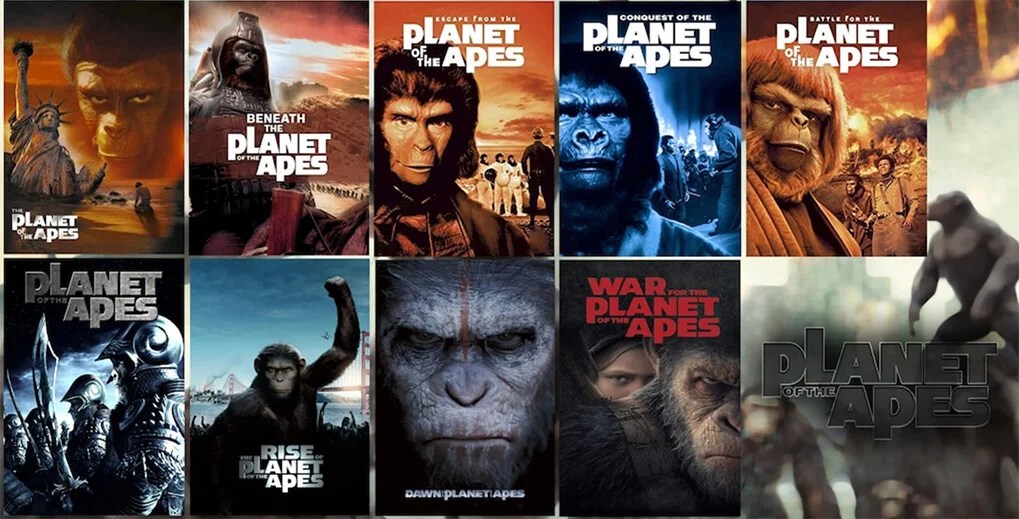A Comprehensive Guide To The Iconic Franchise

The "Planet of the Apes" order is a captivating topic that has intrigued audiences for decades. This science fiction franchise has not only entertained viewers but has also sparked discussions about humanity, evolution, and animal rights. From its origins in the 1968 film to the recent reboots, the "Planet of the Apes" series has undergone a fascinating transformation. In this article, we will explore the chronological order of the films, delve into their themes, and examine their cultural impact.
The "Planet of the Apes" franchise began with Pierre Boulle's novel "La Planète des Singes," published in 1963, which laid the foundation for this iconic series. The initial film adaptation, released in 1968, introduced audiences to a dystopian world where apes ruled over humans. This film was a critical and commercial success, leading to a series of sequels, remakes, and a reimagined trilogy. Understanding the order of these films is essential for both new viewers and long-time fans.
In this article, we will break down the "Planet of the Apes" films in chronological order, discuss the key themes that resonate throughout the series, and highlight the significance of the franchise in the broader context of cinema. Whether you are a newcomer or a lifelong fan, this guide will provide you with valuable insights into the "Planet of the Apes" order.
Table of Contents
1. The Original Series
The original "Planet of the Apes" series began in 1968 and consists of five films. Here is the order of the original series:
- Planet of the Apes (1968) - The film that started it all, where astronaut George Taylor, played by Charlton Heston, crash-lands on a planet ruled by intelligent apes.
- Escape from the Planet of the Apes (1971) - This sequel follows the two intelligent apes, Cornelius and Zira, who travel back in time to 20th-century Earth.
- Conquest of the Planet of the Apes (1972) - Set in a dystopian future, this film depicts the rise of apes as they rebel against their human oppressors.
- Battle for the Planet of the Apes (1973) - The final installment of the original series, where the peace between humans and apes is tested.
- Planet of the Apes (2001) - Although a reboot, this film is often considered part of the original series due to its connection to the earlier films.
2. The Tim Burton Remake
In 2001, Tim Burton directed a remake of the original "Planet of the Apes" film. This film features Mark Wahlberg as the lead character, Captain Leo Davidson, who finds himself in a world dominated by apes. While the film received mixed reviews, it introduced the franchise to a new generation of viewers.
3. The New Trilogy
Beginning in 2011, a new trilogy revitalized the franchise, offering a modern take on the "Planet of the Apes" story. The order of the new trilogy is as follows:
- Rise of the Planet of the Apes (2011) - This film tells the origin story of Caesar, an intelligent chimpanzee, and his journey to lead a revolution against humans.
- Dawn of the Planet of the Apes (2014) - Set ten years after the outbreak of a virus that decimated humanity, this film explores the fragile peace between the remaining humans and the ape society.
- War for the Planet of the Apes (2017) - The epic conclusion of the trilogy, where Caesar faces off against a ruthless human military leader.
4. Themes and Messages
The "Planet of the Apes" franchise is rich with themes that resonate with audiences. Some of the most prominent themes include:
- Evolution and Humanity: The films explore the evolution of both apes and humans, raising questions about what it means to be human.
- Social Commentary: The franchise often critiques social hierarchies, discrimination, and the consequences of unchecked power.
- Animal Rights: The portrayal of apes as sentient beings raises ethical questions about animal treatment and rights.
5. Cultural Impact
The "Planet of the Apes" franchise has had a significant cultural impact since its inception. It has influenced various aspects of popular culture, including:
- Film and Television: The franchise has inspired numerous adaptations, parodies, and references in other media.
- Merchandising: Action figures, clothing, and collectibles have become popular among fans.
- Academic Discussions: The themes of the franchise have led to scholarly analysis and discussions about identity, ethics, and society.
6. Biographical Overview
Here is a brief overview of the key figures involved in the "Planet of the Apes" franchise:
| Name | Role | Notable Works |
|---|---|---|
| Pierre Boulle | Author | La Planète des Singes |
| Franklin J. Schaffner | Director | Planet of the Apes (1968) |
| Tim Burton | Director | Planet of the Apes (2001) |
| Matt Reeves | Director | Dawn of the Planet of the Apes, War for the Planet of the Apes |
| Andy Serkis | Actor (Caesar) | Rise, Dawn, and War for the Planet of the Apes |
7. Future of the Franchise
As of now, there are discussions about the future of the "Planet of the Apes" franchise. With the success of the new trilogy, fans are eager to see where the story will go next. There are rumors of potential spin-offs and further explorations of the ape society in future films.
8. Conclusion
In conclusion, the "Planet of the Apes" order is a vital aspect of understanding this iconic franchise. From the original series to the new trilogy, each film contributes to the rich tapestry of storytelling that raises important questions about humanity and society. We invite you to share your thoughts in the comments below, and don't forget to explore more articles on our site about film history and analysis.
Thank you for reading! We hope you enjoyed this comprehensive guide to the "Planet of the Apes" order and will return for more insightful content.
ncG1vNJzZmirn521b6%2FOpmatoJWovKm01qarp52nqH5wvMuapZ6sXaSzbsDHnmSaqJWoerC%2Bw56pZ6Ckork%3D